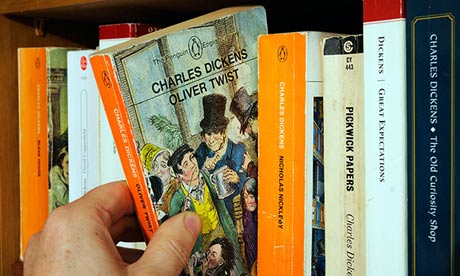Robert McCrum introduces our definitive list of the greatest novels written in English, a 100-week project that begins with John Bunyan's The Pilgrim's Progress

'A classic is a book that has never finished what it wants to say,' said Italo Calvino, Photograph: Alamy
If lists are a guilty pleasure, then book lists are a sinful addiction. That's an observation for which the Observer can adduce empirical evidence.
Ten years ago, on 12 October 2003, in a headline-grabbing stunt, writing as literary editor, I compiled (with a lot of help from colleagues) a list, provocatively entitled "The 100 Greatest Novels of All Time".
Say what you like about lists, but this one rapidly developed a life of its own, like a sci-fi alien. Once the initial furore – why no Updike? How on earth could we exclude PG Wodehouse? – had died down, the creature we had created continued to circulate in cyberspace, sponsoring a rare mixture of rage and delight, apparently without rhyme or reason. Every now and again, some particular group would tangle with the Observer list. And it would drive them mad (in good and bad ways) all over again. For reasons I have yet to fathom, it excited special notice in Australia.
It was not all browbeating and brickbats. There have been some lovely creative dividends. Last year, the Antwerp artist Tom Haentjens came up with an idea that promises to give the list a whole new lease of life – an artistic reinterpretation of all 100 book covers, curated by Haentjens himself.
As well as puzzling over the strange appeal of the list throughout this past decade, I have had a sneaking worry that, drawn at random, from many different literatures, our selection was too spontaneous and too wide-ranging. Was there not a case for a more considered compilation? What, for example, would a list of the 100 classic British and American novels look like?
Today, we begin to provide the answer. What's more, we will show our reasoning in a series of short essays, a kind of footnote to each choice. Without any reference to the 2003 list, for the next 100 weeks the Observer, in collaboration with the Guardian, and supported by Waterstones, will publish a serial account of the classic English and American novel, from A to Z, and from the late 17th century to the present day.
We start with The Pilgrim's Progress of 1678. This, for the Oxford Companion to English Literature, is "a seminal text in the development of the realistic novel", a book that inspired Dickens, Thackeray, Trollope and Mark Twain. Exactly where we shall end is anyone's guess, but one possible cut-off is the year 2000, when JM Coetzee won the Booker prize for the second time with Disgrace.
More
Ten years ago, on 12 October 2003, in a headline-grabbing stunt, writing as literary editor, I compiled (with a lot of help from colleagues) a list, provocatively entitled "The 100 Greatest Novels of All Time".
Say what you like about lists, but this one rapidly developed a life of its own, like a sci-fi alien. Once the initial furore – why no Updike? How on earth could we exclude PG Wodehouse? – had died down, the creature we had created continued to circulate in cyberspace, sponsoring a rare mixture of rage and delight, apparently without rhyme or reason. Every now and again, some particular group would tangle with the Observer list. And it would drive them mad (in good and bad ways) all over again. For reasons I have yet to fathom, it excited special notice in Australia.
It was not all browbeating and brickbats. There have been some lovely creative dividends. Last year, the Antwerp artist Tom Haentjens came up with an idea that promises to give the list a whole new lease of life – an artistic reinterpretation of all 100 book covers, curated by Haentjens himself.
As well as puzzling over the strange appeal of the list throughout this past decade, I have had a sneaking worry that, drawn at random, from many different literatures, our selection was too spontaneous and too wide-ranging. Was there not a case for a more considered compilation? What, for example, would a list of the 100 classic British and American novels look like?
Today, we begin to provide the answer. What's more, we will show our reasoning in a series of short essays, a kind of footnote to each choice. Without any reference to the 2003 list, for the next 100 weeks the Observer, in collaboration with the Guardian, and supported by Waterstones, will publish a serial account of the classic English and American novel, from A to Z, and from the late 17th century to the present day.
We start with The Pilgrim's Progress of 1678. This, for the Oxford Companion to English Literature, is "a seminal text in the development of the realistic novel", a book that inspired Dickens, Thackeray, Trollope and Mark Twain. Exactly where we shall end is anyone's guess, but one possible cut-off is the year 2000, when JM Coetzee won the Booker prize for the second time with Disgrace.
More
No comments:
Post a Comment